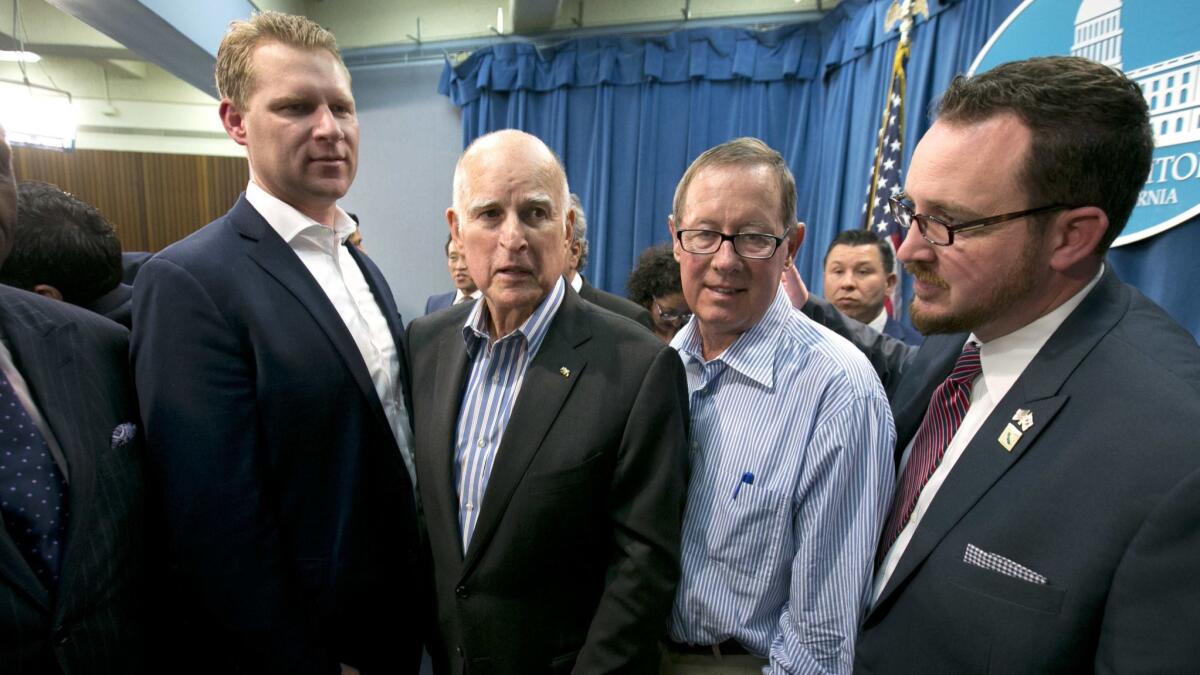Endorsement: Proposition 70 is little more than ballot clutter. Vote no

- Share via
To reach the grand bargain with the Legislature that ensured the survival of California’s signature cap-and-trade program last summer, Gov. Jerry Brown had to agree to a compromise.
He needed a two-thirds majority in the Assembly and Senate to protect cap-and-trade, which is the centerpiece of the state’s ambitious climate change agenda; the program requires companies to buy permits to release greenhouse gas emissions. With a handful of Democrats opposed to the extension, Brown turned to GOP lawmakers, including then-Assembly Republican leader Chad Mayes (R-Yucca Valley).
Mayes helped secure the eight Republican votes needed; Brown in turn agreed to put Proposition 70, a state constitutional amendment, on next month’s ballot. The measure, if passed, would give the minority party a say over how billions of dollars raised through cap and trade are spent — for one year.
Here’s how it would work. In normal years — including every year from now until 2024 — the Legislature would decide by simple majority vote how to spend the billions of dollars generated from cap-and-trade auctions. But in 2024, Proposition 70 would require a special, one-time, two-thirds majority vote in the Legislature to approve that year’s spending of cap-and-trade revenue. Because of the supermajority requirement, some Republican votes would probably be needed to pass the spending plan. Thus their input would be solicited and their favor would be courted.
There’s no point cluttering the ballot with so-called reform measures that serve little or no purpose.
For the following year and every year after, the process would revert, and only a simple majority vote would be needed to spend the cap-and-trade revenue.
Kudos to Brown and Mayes for crafting a bipartisan compromise that will keep California’s climate change program on track. Both leaders have now lived up to their agreement. Proposition 70 is on the ballot, as Brown promised it would be. And Brown has joined Mayes in advocating for its passage, even though the measure could jeopardize funding for one of governor’s legacy projects — the bullet train, which is forecast to receive about $750 million a year from cap-and-trade revenue.
But none of that means voters should support it. In fact, they should reject this pointless exercise. There is little indication that a supermajority vote in 2024 would result in more responsible spending, as supporters of Prop 70 claim. History shows that when legislators need to find enough votes to reach a two-thirds threshold, they are more likely to end up funding pet projects to persuade (or buy the votes of) on-the-fence lawmakers.
And why should voters today bind the hands of lawmakers, one time, in 2024? If voters are truly concerned (and there’s no indication that they are) about how climate change dollars are being spent, they should address that problem now rather than waiting until 2024.
There’s no point cluttering the ballot with so-called reform measures that serve little or no purpose. Vote no on Proposition 70.
Follow the Opinion section on Twitter @latimesopinion and Facebook
More to Read
A cure for the common opinion
Get thought-provoking perspectives with our weekly newsletter.
You may occasionally receive promotional content from the Los Angeles Times.










